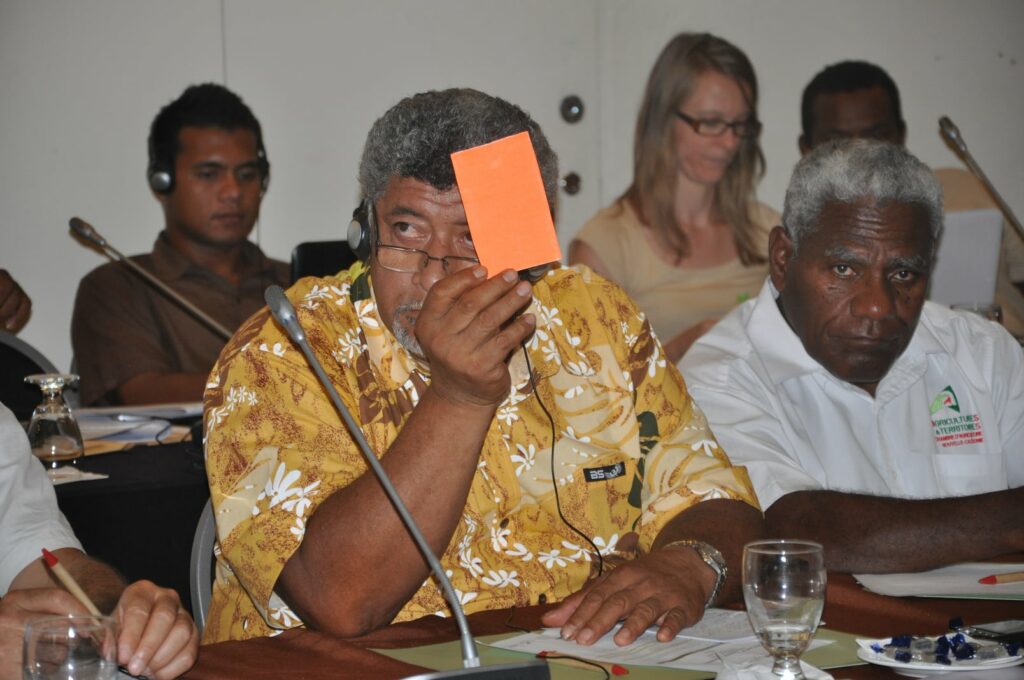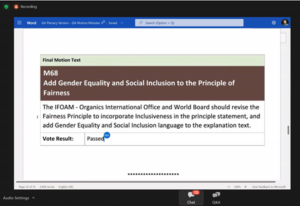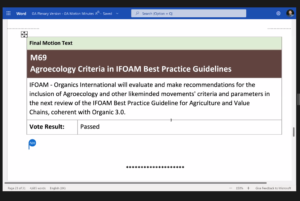
A note from the POETCom Coordinator
Since the last issue of Cultivating Community there have been two events of particular significance to POETCom and to the Pasifika organic movement: the International Federation of Organic Agricultural Movement’s (IFOAM) World Congress and General Assembly in August and, more recently, the POETCom General Assembly (GA) in November. In keeping with the spirit of POETCom working communally, regionally and globally, it seems appropriate to touch on both.
The POETCom GA was held as a hybrid virtual event with more than 50 attendees online each day as groups of ‘POETCom-rads’ congregated in small groups depending on the COVID-19 restrictions.
The Focal Points unanimously elected the fourth POETCom Board which will take up the torch from the previous Board, and continue to guide the work of the secretariat. In the spirit of transparency, inclusivity, accessibility and two-way communication, the Board contacts are included in this newsletter (see side bar). Special thanks to outgoing/retiring Board members Gilles Parzy, Francois Japiot and Jone Hawea for their work that sets the stage for this group, to returning senior members Nambo Moses and Georgina Bonin for agreeing to stay on the Board for the next term, and congratulations to new Chair Sashi Kiran, Co-Chairs Franck Soury-Lavergne, and Litia Taukave, and to Drew Havea and Io Vakapora for their commitment to carrying us forward.
The often-repeated theme of this GA was the importance of the POETCom membership, and the essentiality of collaboration and communication as together we grow the organic movement in the Pacific. We heard first-findings, initial recommendations and the critically important role of the membership going forward from the expert contractors reviewing POETCom governance and the Pacific Organic Standard guidebook. With the first of two regional workshops aimed at developing the Organic Policy Toolkit, members were introduced to the Building Capacity for Non-State Actors to Lead Sustainable Agriculture Policy Development project.
Special thanks to the projects that sponsored the assembly: Protégé and the Pacific Islands Forum Secretariat, to the SPC technical staff and interpreters for their flawless work, to the presenters for their quality information and, most importantly, to the Focal Points, members and supporters who took the time to attend and engage.

Motion to Include Gender Equality and Social Inclusion passed at IFOAM Organics International’s General Assembly
On the global stage, the IFOAM Organics World Congress and General Assembly takes place every three years in various locations around the world. This 20th congress was hosted in Rennes, France but held virtually, meaning that for us in the Pacific sessions took place in the wee hours. More difficult than the timing though was deciding what sessions to attend from the many simultaneous offerings. it seemed that in every case, though, whatever choice we made led to interesting and inspirational presentations. It is heartening to see that although our soils, crops and traditions are unique to the Pacific, our passion, challenges and aspirations are shared with countless farmers in many countries around the globe. One presentation that struck me right between the eyes and found me spilling tea to scribble notes was from Helmy Abouleish, CEO of the SEKEM Community Agriculture project in Egypt who described their concept of the “economy of love”, which asks four questions to every consumer around the world: how is this product affecting (i) the environment; (ii) our communities; (iii) human beings; and (iv) fair prices? The economy of love perfectly encapsulates our organic movement as we talk about creating sustainable and pro-poor value chains that are truly beneficial to the environment and to all the smallholders along the way.

Motion to add Agroecology Criteria into IFOAM Organics International’s Best Practice Guidelines passed at IFOAM Organics International’s General Assembly
In conjunction with the congress, IFOAM held their General Assembly as well, and the Oceania Pasifika region was well represented and influential. Although Oceania bid to host the 2024 Congress in Brisbane, our region was outvoted by Tunisia. However, Karen Mapusua was re-elected to the Board and elevated to President. In addition, POETCom and the Pacific region left its mark on the proceedings with two successful motions that will forever raise the bar on gender inclusion and agroecological practices.
As we look back on the past year, and forward to the new one, it will be impossible not to reflect that in many ways 2021 will forever be seen as a watershed year, changing the course of history and our ways of working and living. Despite, and maybe because of its many challenges, 2021 was a good year for the local, regional and global organic movement. On behalf of all of us at the POETCom Secretariat, may the holiday season, including the new year, find you optimistic and full of hope, and may you realise both through family, friends, fellowship and food.
Blessings and peace,
Jim